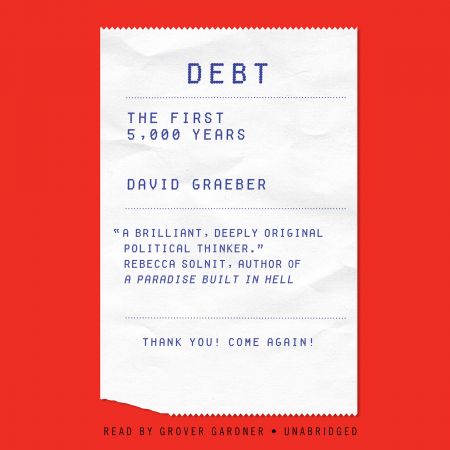Debt: The First 5,000 Years
The behavioural economist Uri Gneezy once ran a famous experiment on incentives at a chain of day care centres in Haifa. In order to incentivise parents to be on time to pick up their kids they introduced a small but meaningful “late fee” in some of the centres, for parents who were more than ten minutes late. Rather than this cutting reducing late pick-ups, average delinquency in those centres with the fine doubled. The fixed penalty put a value on the inconvenience: it converted a moral obligation into a financial one, and in doing so something meaningful was lost.

|
“What is a “debt”, anyway? A debt is just a perversion of a promise. It is a promise corrupted by both math and violence.”
That something is the motivating force behind this highly entertaining, learned, and stimulating book. David Graeber’s history —and there’s plenty of history, right back to the myth — yes, myth — of the foundation of money in barter — poses this central question: what happens when we reduce our sense of morality and justice to the language of a business deal?
“What,” Graeber asks in the first chapter, “does it mean when we reduce moral obligations to debts?”
To be sure, David Graeber did not come at this question from a conventional place. He was an anthropologist, not an economist or a historian, and of the anarchist left: he was instrumental in establishing the Occupy Wall Street movement. But it would be a grave mistake to write off his book as a Marxist screed. There is so much of value here: in challenging conventional, lazy and simplistic ways we have at looking at the world. Graeber was ... what’s the word? — oh that’s it: a contrarian.
The best thing to do is just pick out some challenging points. Playfully, Graeber introduces the notion of “everyday communism” — I think he could have called it “communalism”, but that wouldn’t have upset the horses — as an alternative to an economic life of sterile, impersonal, quantifiable transactions. This communism: helping people out without question where the relative personal cost is not great; being a good egg is deeper and more critical to interpersonal relationships than economic transactions, and they depend on it. It is a radical view, not supported by plausible arguments, to try to atomise these unquantifiable social relationships — James C. Scott might have called them “illegible” to a pattern of economic transactions. “If someone fixing a broken water pipe says, ‘Hand me the wrench,’ his co-worker will not, generally speaking, say, “And what do I get for it?’ ”
The distinction between a debt — quantifiable obligation to pay a sum of money on a certain date; which in its fungibility and transferability is an impersonal thing — and a personal obligation in the wider sense (rather similar to the one yours truly draws between a liability and an obligation): A debt is a of money
“Cancel student loan debt? But that would be unfair to all those people who struggled for years to pay back their student loans.” Let me assure the reader as someone who struggled for years to pay back his student loans and finally did so, this argument makes about as much sense as saying it would be unfair to a mugging victim not to mug their neighbours too.
The question now is how to ratchet things down a bit: to configure society so that people can live a bit more by working less.